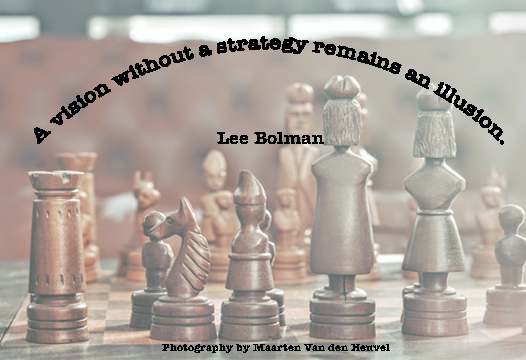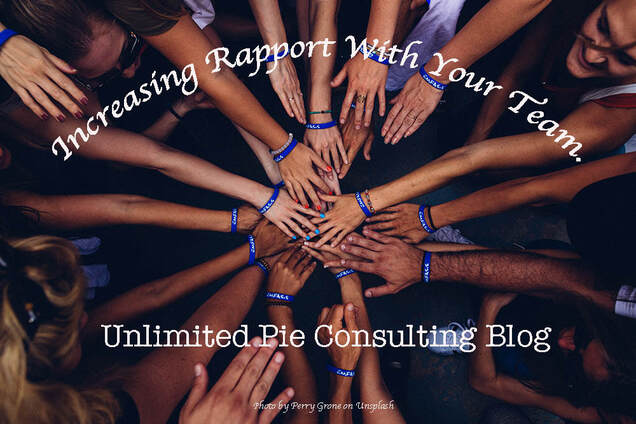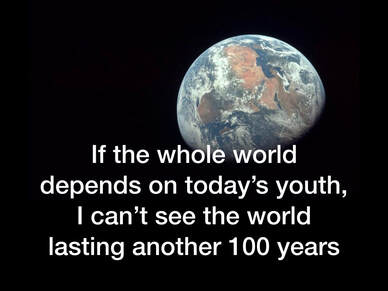|
Leadership is vision.
If I have no vision, then were am I going? Where am I leading those that have chosen to struggle with me to accomplish great things? Without vision we are a team with no goal. Even once we have a goal, we must have a strategy to achieve that goal, and a strategy without a great culture is a sure-fire way to fail at achieving that goal. I know that I harp on culture quite a bit. But we all know organizations that had a great vision, an amazing strategy, but a lousy culture. Where are those organizations today? Most have failed in achieving the goal they had, and many have been abject failures as a business. Their potential success devoured by a failed culture. To borrow a line from Jim Collins "Culture eats strategy for lunch." No matter how great my vision and strategy as a leader, if I don't spend the time creating a culture that nurtures success, that keeps my people and my customers engaged and feeling part of something much bigger than themselves, we will ultimately fail. Oh, we may achieve the goal, we might even excel at it, but if we leave behind a washed-up, burned-out staff, and a 4-page list of disgruntled ex-employees what do we have? Over the years I've worked, both in and out of leadership, I have seen examples of both good cultures and bad cultures. I've worked in places that transitioned from good to bad, and I'm sad to say that I have even created some of the bad cultures as a young, inexperienced "leader" ("practicing management without a license" as my friend John Graci says). In that time I have noticed three things that were consistent in those places that had great cultures and were inconsistent or completely lacking in those companies with poor cultures. Companies with great cultures: 1. Focus on team member strengths rather than weaknesses. A focus on strengths allows us to align our team so that each team member can bring their best performance to the table. When every team member is able to use their strengths each day to help accomplish the goals, they are more fulfilled and less stressed. NO, I am NOT saying ignore weaknesses and poor performance. But when we do have to have that conversation that no leader, or team member, wants to have (performance) both you and your employee will be in a much better position to actually correct their performance. By helping the team member identify their strengths, recognize how they can use them to better their performance they will do a much better job of converting their performance. 2. Have a culture that promotes team members to self-govern. Doing number one well will provide your team members with a process to self-identify issues (performance or inefficiencies/problems) and help feel more comfortable proactively in dealing with them. By empowering employees to make decisions about the process and how they achieve the goal (or improve the performance), we give them ownership of that performance and of the final product. Employees that feel ownership over the process and the results are much more likely to proactively deal with issues directly rather than feeling a need to come to you looking for a solution or validation. This allows you to spend your time leading rather than problem-solving for the team. 3. Practice direct communication rather than email or memo. Your team does not need another email or memo to spur them on to great performance. They need you to get out from behind your desk or door and talk to them. You can not lead from behind...to lead you need to be out front pointing the way and cheering them on. Leaders of great teams follow the advice of Tom Peters and implement MBWA (Managing By Wandering Around). Instead of being behind the desk crafting your next "inspiring" email, leaders who practice MBWA are out providing their team with face-time. Asking them about pain-points, bottlenecks, and inefficiencies, asking about what the team member would do to fix it, and then empowering them to fix it. They encourage employees to try new techniques, and to look for ways to be better. That kind of conversation will NEVER happen by email or by shotgun memo, it requires people being face-to-face discussing the issues, being open to feedback, and empowered to think differently. If you look at truly great organizations, that stay great for a long time, you will see these three leadership strategies being used to create a culture that encourages and empowers its people to be the best they can be. I can teach you how to put these in place with your team. Give me a call and we can talk in more detail about how you can benefit from creating a culture of empowerment and communication. Leave a comment below and share your list of practices you see that create a great culture that allows a team to excel!
0 Comments
As leaders we quickly learn (either by observation of a great leader or by creating our own "experiences") that the best way to increase productively and engagement, to create the culture where everyone wants to work with you, and get people to want to follow you is to maintain great relationships with your team. Relationships are everything. People may initially join your organization/team because of what you are doing, or making...but they stay based on the quality of the relationships that they have at work. I don't care what you do, offer, or sell, building relationships is a basic skill you need to become good at in order to be successful. Building and maintaining great relationships takes work and commitment on the part of the leader, and if done well, that work provides significant ROI for both the team we support and for the company we work for, or run.
How can we increase that rapport with those who chose to struggle with us? I was recently reading an article from Miller Heiman Group out of the UK. This article was written to sales people to teach them how to build rapport with their customers to increase sales opportunities. As I read through the article I was struck by how, with a little editing and massaging this material applied to those of us that lead. These four great techniques can be used by leaders to improve the relationships we maintain at work and home. 1. Develop a Clear, Complete, and Mutual Understanding of Your Team Member's Needs/Motivations. Without this understanding we, as leaders, are stumbling around in the dark trying to understand what motivates a team member. Don't ever forget that these needs/motivations your are going to hear are unique to each individual. You can't figure this out by looking at their birth date and applying some gen-experts opinions about what motivates people at that age (I deal with this topic in Episode 1 of Unlimited Leadership Podcast). Relationship building must be done on a regular basis; this is NOT a one-and-done event. We must make regular opportunities to talk to get a complete and clear picture. 2. Guide Your Team Member in Expressing What They Need. It takes sitting down with each individual team member and asking them specific questions intended to get at what it is that they are looking to accomplish and then really listening and processing what they say. Asking questions about what gets them excited, what makes them jump out of bed each day, what they love and hate about their job, what are they looking to accomplish in their lives? I have a list that I share with my clients that they can use during coaching sessions that will help them develop a clearer picture of what their team member needs so that we can create an environment where they chose each day to struggle with the team to accomplish great things. If I don't understand what is critically important to them, I will NEVER be able to create a great relationship with them. 3. Understand That Your Team Member's Needs Are Tied to Real Emotions. The needs, wants, and motivations of your team members are tied to solid emotions for that team member. While something that motivates one of your team members may seem silly or unimportant to you, remember that something has happened in that team member's life that makes that need/want/emotion critically important to them at this time. High Emotional Intelligence will help you get a better understanding of what is driving that emotion and empathy toward why that need is important will go a long way (see Episode 2 of Unlimited Leadership Podcast for more information about Emotional Intelligence). Empathy is a great relationship builder. If I truly understand why it is important to that team member I am more likely to remember and use that information when the opportunity presents itself as I work with that team member. Empathy is the great relationship builder. 4. End Each Meeting With an Action Plan. Even if that action plan is to meet again to find out more. It may not even be an action plan with the team member, it can be a commitment to come up with a way that you can use this information to help them enjoy what they are doing more, simply acquiring this information will accomplish nothing. As the leader we need to commit to using the information to help our team members become better, enjoy their work more, and/or accomplish what they view as important. If I don't I have just wasted their time and mine. You musk as yourself. "How can I use this information to help this make our relationship better?" and you must then commit to actually doing it. By using these four ideas; Developing a clear and mutual understanding of what they want/need, helping them express those needs/wants, understanding that those wants/needs are tied to emotions, and making an action plan for achieving those needs/wants, leaders can help their team members achieve what they want, while our team/department/business achieves what it needs. A true Win-Win-Win. They win, I win, the business wins. Unlimited Pie Consulting has many programs that will help you create the relationships and culture you want for your team and business. You can contact us with questions about how we can help you grow your team and business. I look forward to helping you grow your business. Make it a great week. Scott In a world of 24/7/365 contact, push notifications, social media, instant messaging, and texting, we're becoming increasingly distracted at work. A study by Dovico showed that the average person is distracted 50 to 60 times during their work day, and a full 80% of those distractions are not important. These distractions prevent us and our team from spending more time in the "Flow " where human beings are almost 4 times more productive. As a result, our teams are less productive and more stressed than they've ever been. So much for technology making humans more productive...
So what can we do? How can we stop the insanity and allow our teams and ourselves to spend more time actually doing what we are good at?? How can we remove that constant feeling of being behind? The folks at HBR have ten suggestions. I've stolen their list, but am putting my twist on their list.... 1. Email and texts do NOT equal instant messaging. Somehow we have become trained to believe that emails and texts need to be responded to immediately, just like an IM or a phone call. They do not. It is okay to answer emails, social medial and texts at a time that is convenient for you. We'll be talking about how in our next tip. BTW, let your team and the customers that contact you directly know that you are going to change this up, especially if you have trained them to expect instant answers from you. Use an auto-response to let them know you got it and you'll respond as soon as you can. 2. Batch check everything. Set up a time for you to check your email, social medial, and texts. Even a "quick look" to check things out makes us significantly less productive throughout our day. I had to set a timer to remind myself to check emails on the hour (roughly). Do yourself a favor...shut off the push notifications that pop up each time you receive an email. Even looking at the notification will take you out of The Zone of Productivity and cause you to take about 15-20 minutes to return to the same level of productivity. 3. Do not disturb. This can be tough especially in an "open" office environment (the topic for another blog post later). Devise a "signal" that is universally recognized by your team as the sign for "please do not disturb unless the building is on fire". I've seen signs used effectively, some have used small "flags" that people pop up to indicate they are in DND mode. To be effective, this needs to be allowed for every member of your team and you need to respect it as you expect them to respect your DND time. "But we're in the Customer Service department...how would we EVER do this?" Scheduling "project time" and having a place to go that is off the sales floor to work on projects has been used quite effectively in active Customer Service areas. 4. Avoid the calendar game Block out times on your calendar for you to work. Scheduled work times avoid the game of calendar Tetris that people play with calendars. BUT, don't do like one executive I have worked with who blocks entire weeks for work leaving no way for a team member to see when they are available to schedule time with them. This does the exact opposite as it requires several emails back-and-forth to schedule a meeting, which reduces everyone's effectiveness, including yours, as you are now busy answering several emails providing dates and times when you are available. 5. Make meetings more productive... By requiring less follow-up. make sure that each meeting ends with:
6. Stop Using Reply All This just adds unnecessary clutter to everyone's inbox. Reply only to those that need to see your reply. 7. Find a quiet place. And for this don't just think audible distractions, think visual. The more we have going on around us (and in an open environment that's virtually EVERYTHING) the easier it is to become distracted, and as we mentioned in number 2 distractions cost us time to get back into the "flow" which does = lost money. If nothing else, negotiate time to work from home during some of your week to lessen your distractions. 8. Turn off push notifications. Distractions, distractions, distractions...not sure how to do this. Here is a great resource for the how. Remember "The Flow" as defined in #'s 2 and 7?? 9. Use airplane mode on your electronic devices. Used during certain times of the day this technique can ensure that you are not disturbed. Concerned about missing the all-important message from your spouse, or waiting for some critical information from a team member or a customer? Use Do Not Disturb mode and set them up as a VIP, so that they will be able to get through, or set DND mode so that a second call from the same number rings through. 10. Empower your team. If they don't need to come to you for approval, they don't need to disturb you. Push all but the most critical or controversial decisions to your team. After all, that's why you brought them onto your team, right?? The fewer times you have to be disturbed...(you know "The Flow" in #2 and #7) I know that not everyone can implement all of these in your work environment, but there should be at least 1 or 2 things in the list that you CAN implement to help yourself feel less "late" and harried and make yourself more productive. Leave me a comment with a technique you use to make yourself more productive and it may show up in a future episode of Unlimited Leadership, my podcast. See ya next time...and tune into our podcast Unlimited Leadership for even more. Scott Any guess who said this?
Since the dawn of a younger generation, the older generation has been convinced that the younger generation is lazy, under-motivated, and destined to destroy all that the older generation has built. Don't believe it? “[Young people] are high-minded because they have not yet been humbled by life, nor have they experienced the force of circumstances. … They think they know everything, and are always quite sure about it.” Any guess? Nope, not one of the gen-experts from the 80's or 2000's. That quote is from the writings of Aristotle and it dates back to about 4000 B.C. But we've gotten better since the dawning of the enlightened age...right? “Youth were never more sawcie, yea never more savagely saucie . . . the ancient are scorned, the honourable are contemned, the magistrate is not dreaded.” This little tidbit comes from Robert Barnes and it was penned in 1624. And it goes the other way as well. For as long as there has been a younger generation, they have been convinced that the older generation is destroying the future. "The older generations have eaten the future of the younger ones." Penned in the late 1960's by Giuliano Amato a statesman from Italy. Sounds somewhat similar to what we are hearing from today's youth. My point is, that it is human nature to blame others for what we view are the faults of another group (In-Group/Out-Group Dynamics). If we really look at what we are seeing, the younger generation is doing exactly what we, the older generation, did. We see the world very differently as we age and gain "experience", and much of what I hear coming from younger people are statements that I made when I was their age and in their life stage. I know I have uttered the phrase "If they would just put me in charge...I would fix it all." - Scott Wuerch ~age 23. What we ascribe to "generations" is most likely actually caused by the stage of life, and the socio-economic status of the person we're looking at. My other point is that it is time to put a stop to the name-calling and assumptions of that "other" group (doesn't matter if it is age, skin color, ethnic origin, sex, hair color, etc) and realize that we are ALL in this together and if we want a better outcome it is going to require that we all work together to achieve it. It is time to put away our assumptions, our biases, and our anger and get to know each other in a way that helps us understand what we all want and how we need to work with each other to accomplish what we are looking to achieve. If we can do that, then we will be able to achieve much as the human race! We've seen it happen on a smaller scale when a group (community, company, etc) comes together and knocks it out of the park because they we concentrating on what they had in common rather than in their differences. It's past time for us as a society, as a mass of humanity, to do the same thing. When we finally do, the possibilities for what we can accomplish are endless. Oh, the quote in the picture at the head of this blog...that's from Socrates and it was recorded somewhere around 2400 B.C. Are we actually still in the same place as a race (human race) that we were in 4000 and 2400 B.C.? Kinda sounds like it, doesn't it? I like to think that we are capable of better. The date is drawing closer...
Jan 1 is just a few weeks away. I know what you're thinking. "Yup, Scott. New Year's Day is only 3 weeks away. So what?" Well it's a big deal here. While you are correct, it is New Year's Day; which by itself is a reason celebrate. In our household it has some additional significance. It is the birthday of Unlimited Pie Consulting LLC. The first day it is a legal entity, officially recognized by the State of Wisconsin and the US Government (well at least the IRS). That's a big day here at our house. I've been working toward that day for over 2 years now. Meeting with a recognized expert in the field of business consulting and coaching. Negotiating the contract to use the name Business Partner Peer Groups and getting assistance and coaching from the person who built his business using that name. Arranging for someone to keep the books (not my strong-suit...but if you need a recommendation call me. I have a GREAT bookkeeper). Ironing out the details, designing logos, setting up a website and a podcast, setting dates, working on mission, values, and goals. You know, all the stuff that needs to be done before you can welcome your first customer. It all seems so daunting at first, but taking it a step at a time, and sometimes "just doing the next right thing" (thanks Frozen 2!), has made it a bit less daunting. It's hard to believe that we are only three weeks away from the date we set over 9 months ago. Our first podcast will go live shortly after Christmas (click on our RSS feed link to be directed to our podcast), and our initial organizational/informational meetings will be held in January and February (watch our Events page for details). We're almost there and I am so excited about it I could just about pass out. I am excited to see the impact I can have in the lives of others. How I can use my experience and my training to help others be more successful in their business, while I build mine. I'm taking a leap of faith based on the advice of one of my early Mentors, Zig Ziglar who said "You can have everything you want in this life, if you just help enough other people get what they want." This is the entire premise that Unlimited Pie Consulting is based on; building our success on the success of others. To me, there's no better way to build a future, build a business, and be successful. So, why should you read this blog and listen to my podcast? Because we'll be discussing some of the greatest books, articles, videos, and advice for leaders. I'll be dishing on some of the most recent books and articles (and I am hoping to have a few authors and experts join us). Better yet we'll be working on taking that information and making it usable to help you grow YOUR business. Whether you lead a 1-person operation (like me) or you're the CEO of a 5 million-plus dollar operation, there will be something you can take away, something you can share, and something that you can help someone else with. By the way...check out our Services page to see some of what we have to offer. I'd especially like to invite you to come check out what a Business Partner Peer Group can do for you. We'll be building our boards during January and February with our goal of starting to meet regularly by March of 2020. Business Partner Peer Groups are a great way to accelerate your business to new levels of success. It's an exciting time to be an entrepreneur or a business leader. Join us and be even more excited by what you will achieve in 2020. Thanks for checking in on us and make it an awesome week! Scott |
AuthorScott is the owner and principle for Unilimited Pie. He has been many things in his life: Firefighter, Paramedic, Teacher, Business Owner, and Award Winning Leadership Development Expert. But what he is the most proud of are the leaders he has grown over the years in each of his roles. Leadership can be learned, if you have the right person to advocate for YOU. Archives
February 2020
Categories |





